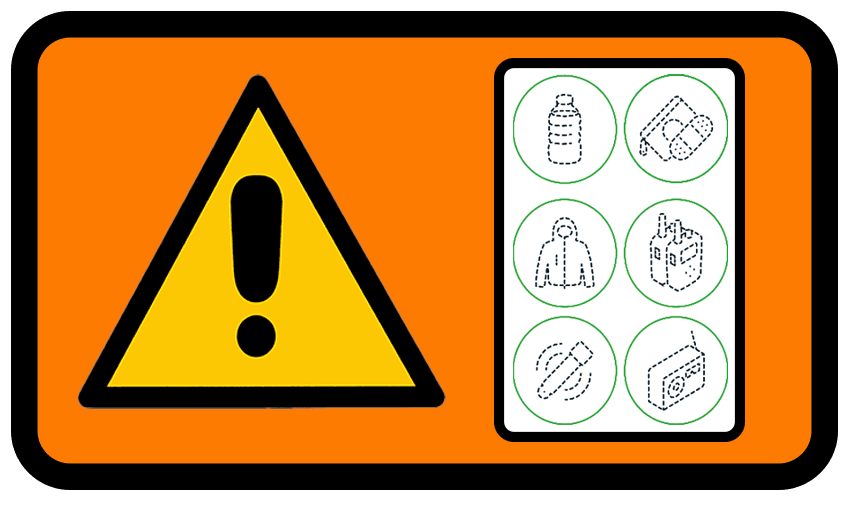There’s no time like the present to pull together an emergency preparation plan, so we asked the experts what you need to know.
The number of New Zealanders who are prepared for a disaster has significantly decreased in recent years, and now only two in five of us feel fully prepared for an emergency or disaster situation. “With severe weather happening more frequently as a result of climate change, it’s more important than ever to be prepared,” says Anthony Frith, communications manager for the National Emergency Management Agency (NEMA). “Being more prepared means that in a disaster, emergency services can focus their limited resources on the people who need the most help.”
With Cyclone Gabrielle on track to hit regions that are still recovering from last month’s catastrophic flooding, NIWA warns that “there’s going to be some real memorable impacts.” Auckland Council is advising people to clear kerbs, inlets and stormwater drains of any debris and take any rubbish directly to drop-off facilities. It also pays to prepare your household, should the worst happen. “We know that disasters are the biggest motivators of preparedness, but people shouldn’t wait for the next big emergency to get prepared,” says Frith.
“And because disasters can happen any time, there’s no time like the present.” Here are some simple steps that you can take to get yourself ready.
Secure your property
NEMA has a lot of handy tips here for securing your property ahead of a storm. Strong winds can lift even large, heavy objects, and the Get Ready site warns that “anything not secured may become a projectile”. Either tie down trampolines or turn them upside down to minimise the exposure to wind, bring your bins and other large items indoors and check trees for weak or hanging limbs. “Identify a safe place in your home to gather during a thunderstorm. This should be a place where there are no windows, skylights or glass doors,” the guide reads. During a storm, do not go outside or drive unless absolutely necessary.
Have a chat
One of the most crucial parts of emergency preparation is having a yarn with your family, flatmates and neighbours about what to do if a disaster were to happen in your area. “People often think being prepared means stocking up on heaps of stuff – like with Covid, how there was a rush on toilet rolls. This turns some people off getting prepared, as they think it’s going to be pricey, which is a big issue in a cost of living crisis,” says Frith. “But the most important step to getting prepared costs nothing – because kōrero is free.”
If you don’t know your neighbours already, now is a great time to go over, introduce yourselves, share contact details and see if they have any specific needs in an emergency situation. The Get Ready website has this handy online guide (available in 21 languages) where you can create your own household plan. It includes filling out a contact list for your entire household and anyone else who might need help around you, as well as planning what to do if you get separated, what to do if you get stuck at home and what to do if you have no power.
The plan doesn’t have to be a complicated mission either. “It could be as simple as knowing that ‘if we can’t get home we’ll meet at Aunty Marama’s on the hill’,” says Frith.
Stay informed
Here’s a question which will send a chill down the spine of many – how will you find out the latest news and keep in touch with people if your normal forms of contact go down? “Disasters can have a knack of knocking out power and communications. So when you make a plan, think about how you’d get through without them,” says Frith. “That’s one of the reasons why radio is so important during emergencies – it’s the most resilient form of mass communications.”
If you find yourself without power, you can use a battery-powered radio or your car radio to stay up to date. In an emergency situation, it is recommended that you tune into Radio New Zealand, The Hits, NewstalkZB, MoreFM or Today FM – NEMA has a Memorandum of Understanding to ensure these broadcasters carry official messages during a major emergency.
If you still have access to the internet, make sure you regularly check your local council’s website and social media accounts on Facebook and Twitter for updates in your region. You can find your local Civil Defence management group here. For national updates, keep an eye on the Civil Defence website and the @NZcivildefence Twitter. Also, as the Auckland floods proved, TikTok can be a useful place to see what’s going on beyond your bubble.
Pack a grab bag
In the event that you need to leave your house in a hurry – think five minutes warning or less – it’s recommended that every household packs a grab bag full of essentials for everyone in the family. There are a few essential items to pack: covered walking shoes, warm clothes, a raincoat, a hat, water and snack food, hand sanitiser, a portable phone charger, cash and copies of your ID and any other important documents.
You don’t need to pack the following away just now, but it is recommended that you know where to find your medication, first aid kit, face masks, torch, radio and batteries in the event you need to grab them at short notice.
Assess your supplies
You might find yourself trapped at home in an emergency, so it pays to assess the supplies that you have. Given there is a cost of living crisis, Frith is quick to point out that this doesn’t necessarily mean spending a lot of money. “When it comes to emergency supplies, most people probably already have a lot of what you need. And if they don’t, we encourage everyone to chat with their neighbours and see if they can share supplies.” Just as an example, a large plastic bucket or container can quickly become an emergency toilet if need be.
Food-wise, you want three days of water for everyone in your household, which means nine litres per person (remember your pets, but we’ll get to them next). This doesn’t have to be a spending exercise either – you can fill up old plastic soda bottles and stash them away. Make sure you have enough long-lasting food for three days at home (and keep in mind that you might not be able to cook if you don’t have gas or a barbecue). Consider any dietary requirements or allergies that people in your household might have.
Don’t forget your pets
Just like everyone in your household, make sure you have enough food and water for your pet for at least three days. If you have to evacuate your home, make sure you have a plan to take your pets with you. As SPCA CEO Gabby Clezy said in the wake of the Auckland floods, “if it isn’t safe for you, it isn’t safe for them.” Make sure your pet’s microchip details are up to date with your current address and your contact phone number. If you can spare $15 you can register them with the New Zealand Companion Animal register in the event that they get lost.
Take care of yourself
“We know disasters can be tough, and many people in Aotearoa are still recovering from a spate of severe weather,” says Frith. It is important to look after your mental wellbeing in times of disaster, and there are a bunch of useful free resources available if you are struggling to cope. All Right was established to support people’s after the Christchurch Earthquakes, Mementia shares practical mental health tips and Just a Thought has practical strategies to cope in times of stress. Make sure you take care of yourself while also looking out for others in your household.



